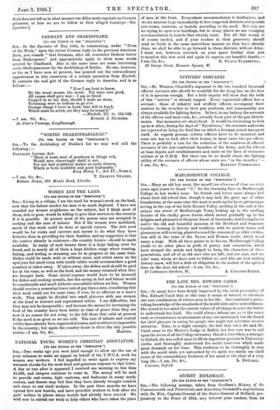WOMEN AND THE LAND.
[TO THE EDITOR 07 THE "SPECTATOR.1 Sra,—Living in a village, I see the need for woman's work on the land, now that the labour market for men is so much depleted. I have not sounded my women neighbours on the subject, but I think most of them, rich or poor, would be willing to give their services to the country if it is possible. At present most of the poorer ones are occupied in cooking and the care of infants. But if the women were mobilized, much of this work could be done at special centres. The first need would be for cooks and caterers and nurses to do what they have hitherto done in providing for their families, and my suggestion is that the centres already in existence—the country houses—should be made available. In many of such houses there is a large baking oven for bread, and in nearly all of them a large kitchen range where roasting, baking, and boiling or steaming can be in progress at the same time. Dishes could be made with or without meat, and either eaten on the spot (one fair-sized room with trestle tables would accommodate a good number) or taken away. If taken away, the dishes used should be paid for at the time, as well as the food, and the money returned when they are brought back. Some initial expense would have to be incurred for dishes and cooking utensils, but the saving in fuel and labour would be considerable and much hitherto unavailable labour set free. Women should receive a somewhat lower rate of pay than a man, considering that their work could not for some time, if ever, be as efficient as a man's work. They might be divided into small platoons with one woman at the head to instruct and superintend others. I see difficulties, but they may not be insuperable ; and because the means for increasing the food of the country have been better in time of peace than they are now is no reason for not using to the full those that exist at present if the need is as great as we are told. The care of infants and central creches have already been organized in towns, and would not be impossible in the country; but again the country house is often the only possible


































 Previous page
Previous page